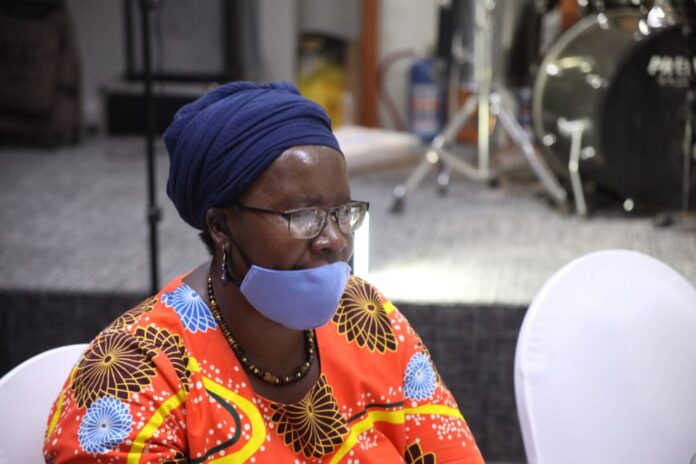Sydney Kawadza
The African Union Goodwill Ambassador on Ending Child Marriages and Rozario Trust chairperson Dr Ndaradzai Gumbonzvanda has berated governments and political leaders across Africa for playing lip-service to the fight against gender-based violence and violation of children and women’s rights.
Officiating at the Amnesty International Zimbabwe commemorations marking 16 Days of Activism against Gender-based Violence, Dr Gumbonzvanda said the continent was gripped by a crisis of disconnect between policies and their implementation.
The event also featured special awards for community theatre groups that have campaigned against GBV while a special award was post-humously awarded to music icon the late Oliver “Tuku” Mtukudzi.
Dr Gumbonzvanda called on African governments to ensure that citizens benefit from the abundant resources and defeat poverty contributing to the social ills being experienced in communities.
“Life is very tough especially in the rural areas. I am tired of the rhetoric. There is such a painful disconnect between policies that we craft to fight against these abuses and their implementation.
“We have baskets and baskets of continental commitments, agreements agreed on by our countries. At SADC, we have a charter on children’s rights, we have the Maputo Protocol on Women’s Rights and we are happy that we have that to protect women.”
SADC countries are also signatories to agreements promoting gender equality including others on ending child marriages including protocols and conventions on the same.
“At national level, in our country, we celebrate writing sections and sections within our Constitution giving us equality between men and women, gender equality.
“We have a gender commission, a ministry promoting women’s programmes, a commission on human rights, a council on human rights, a whole council, and we had a the Education Act amended to give impregnated school a girls a chance to continue with their education.
“Again baskets and baskets of good policies, not sufficient but good enough (as) we can build on them. The crisis that we have is a crisis of implementation.”
Dr Gumbonzvanda said the agreements, protocols and programmes were not benefiting their intended beneficiaries and not changing the lives of the ordinary people.
She called for a shift in policy and taking responsibility beginning from the time the world was commemorating the 16 Days of Activism against Gender-based Violence and going forward.
“This is the time when we need to move beyond awareness, beyond involvement to responsible action. It’s not enough to claim to be an advocate for rights when you have problems at home.
“Your personal behavior is not aligned with that which you are promoting. The first responsibility to end gender-based violence is to align personal lives to prevent violence against women, prevent women from going astray or rejecting child marriages,” she said.
Dr Gumbonzvanda said parenting issues were affecting children in communities.
“We have a crisis of parenting. Schools dump problems on families while parents are blaming authorities for failing to educate the children.
“There is a blame game and our children end up with no one being responsibly for them because we are shifting responsibilities to each other so we need to address the issues to do with parenting.”
Lack of service, she said, was also destroying lives as government had reneged on its responsibilities to look after its citizens.
“Services are our rights. We pay taxes and it’s a right for the children to get these services, for us to fight gender-based violence, we need these services.”
She said lack of services at hospitals and school was virtually condemning the people to deaths.
“We are literally dying because of GBV, we are dying due to preventable pregnancy-related factors, we are dying because there is no medicine in our health institutions and the services are not efficient.
“The responsibility is with the government and our leaders. Public services should be available for the people. In our areas schools should be functional because education is prevention.
“Hospitals should be functional because is the responsibility of the state to offer such services.”
Dr Gumbonzvanda also called for the provision of equal justice with perpetrators of violence or rapists facing the full wrath of the law.
She said government had erred in allocating all resources to the fight against the COVID-19 pandemic when other services were going down.
In addition, Dr Gumbonzvanda said all people across Africa should enjoy the resources that are found in abundance across the continent.
“Africa is not poor, the poverty narrative in Africa is just to make sure that the poor remain resolute. Zimbabwe is not poor and the country’s wealth should for the people and this would reduce the stress people are going through.
“The responsibility for a gender-responsive, socially responsible budgeting and resourcing is in the authorities’ hands.
“We should continue to plug the leakages in our economy, it could be illicit financial flows or corruption, because this GBV is not a micro, a household issue, it’s a macro issue.”
Dr Gumbonzvanda also reiterated the need for organizations to also dump the rhetoric in their language and activities.
Zimbabwe is commemorating the 16 Days of Activism against Gender-based Violence when cases of GBV have increased during the COVID-19 pandemic which has ravaged the whole world.













